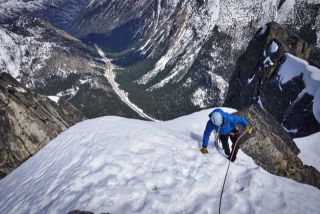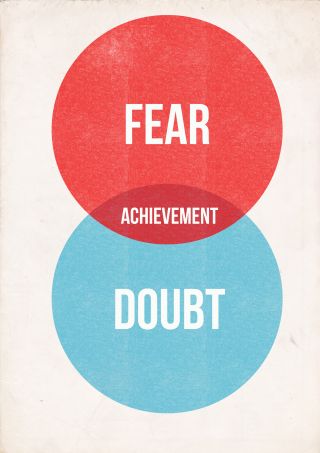Fear
Be Very Afraid: Uncertainty, Fear, and Achievement
Adventure is defined by uncertain outcome and uncertainty drives full engagement
Posted May 18, 2015
Adventure is defined by uncertain outcome. The most significant moments of our lives, the most important decisions and the most meaningful choices are characterized, in part, by uncertainty and by fear. Without uncertainty we have a safe, contained, and predictable experience; we don’t have adventure.

I recall sitting in a tent during a long and drawn out storm deep in the Alaskan wilderness. While we chose a safe and protected camp, all around us huge avalanches peeled off the granite walls and reminded us that we were visitors here; allowed to pass through if armed with sound judgement. I looked at the map for the umpteenth time and my partner simply stated, “if we weren’t afraid, we chose the wrong mountain”.
I was afraid. I was afraid and filled with anxiety because I was missing information and I couldn’t conclusively imagine the unknown. I craved for certainty to quell my anxiety and yet it was uncertainty that fueled my drive and empowered me to be fully engaged, fully present.
Being afraid is evidence that you are at the edge of your comfort zone, and pushing this edge is where growth and learning occurs. It is where practice transitions to performance.
Fear is different than terror.
Fear is different than terror. Terror hijacks us physically and emotionally. Fear energizes and provides focus for challenge and learning. With uncertainty and anxiety creeping in we can quickly dismiss challenge and learning and replace fear with the it’s insidious relative: doubt.

At the crossroad of fear and doubt is the sweet spot of achievement. The arena of possibility and innovation. But how do you transition from fear, doubt, and uncertainty to performance and full engagement?
Move beyond expectations
Expectations are like assumptions, but instead of making an ass out of you they leave you disappointed. Kind of like being an ass, but different. We can influence our outcomes but cannot control them. Expect the worst, you’ll get some version of that. Expect the best, you’ll create a future that is hard to live up to.
Instead of expecting the future to deliver something specific, focus on what you will do to create the experience and outcome you want. Your actions and intentions are within your control and the resulting influence and reaction? Well therein is the mystery and magic.
Be open to possibility
One of the most challenging parts of uncertainty is the inability to plan and the feeling of being out of control. Feeling like you need all the information and possibilities (and their matching solutions) can leave you in a circular dilemma without end.
Break the pattern by loosening your hold on the your predetermined and acceptable outcome. Flexibility, grace, and being open to possibility allows you to fully engage with the experience – in a sense it gives life and vitality to the experience.
Uncertainty is a feeling
Uncertainty is not a fact. It is not a tangible thing. It is not a noun. Uncertainty is a feeling, an emotion. We can easily become lost and overwhelmed in the current of uncertainty.
By stepping back and experiencing uncertainty as an emotion we are freed from the concrete feelings of fear and doubt that coincide with uncertainty. How do we acknowledge and externalize uncertainty? Step back, take a moment. Meditation, journaling, an unplugged face-to-face conversation, a run, a shower…anything to break the pattern and shift your thinking towards clarity and peace.
Practice
Yes, this takes practice…a lifetime of practice (and then some more)!
When you are paralyzed by fear or overwhelmed by anxiety of the unknown it leaves you unable to experience the only aspect of life you can control: the present. Fully engaged leaders recognize that experiencing the present is the key to living and creating with intention.
Practice engaging with uncertainty, acknowledging fear, and transitioning from preparation into action. And then practice it again. And again.
How do you engage with uncertainty? Do you find there are some aspects of your life that are easier than others to have uncertainty? Do you have any tricks or tips that you have found help decrease the anxiety of uncertainty and increase your engagement with the unknown?




